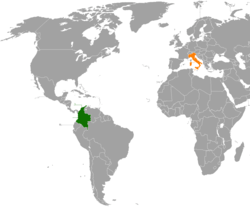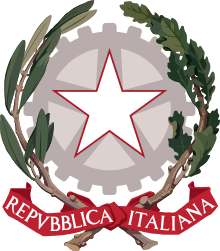Colombia–Italy relations
Colombia–Italy relations refers to the current and historical relations between the Republic of Colombia and the Italian Republic. Both nations are members of the United Nations.
 | |
Colombia |
Italy |
|---|---|
History
In 1502, Italian explorer Christopher Columbus (in the service for Spain) on his fourth voyage encountered the Guna people who inhabit present day Colombia and Panama. Soon afterwards, the land would be christened after Christopher Columbus. In 1819, Colombia obtained its independence from Spain. In 1847 Colombia and Italy established diplomatic relations.[1]
Soon after the establishment of diplomatic relations, Italians began migrating to Colombia. Several thousands arrived to country, most in the early 20th century.[2] During World War II, Colombia broke diplomatic relations with the Axis powers (which includes Italy).[2] Soon afterwards, both nations re-established diplomatic relations.
Relations between both nations have remained close. In 2012, Colombia (and Peru) signed a free trade agreement with the European Union (which includes Italy). There have also been several high-level visits and reunions between leaders of both nations. In October 2015, Prime Minister Matteo Renzi became the first Italian head-of-state to visit Colombia.[3] In December 2016, Colombian President Juan Manuel Santos paid a visit to Italy. During his visit, the Italian government expressed its support for the Colombian peace process between the Colombian government and the FARC.[4]
Bilateral agreements
Both nations have signed several agreements such as an Agreement for the exchange of Diplomatic Grants (1933); Agreement for the abolition of visas in diplomatic and service passports (1962); Agreement on Cultural Cooperation (1963); Agreement for Technical and Scientific Cooperation (1971); Agreement to Avoid Double Taxation of Income (1979); Agreement on Economic, Industrial and Technical Cooperation (1987); Agreement of Cooperation in Support of the Alternative Peace and Development Process (2001) and an Agreement on Defense Cooperation (2010).[5]
Resident diplomatic missions
- Colombia has an embassy in Rome and a consulate-general in Milan.[6]
- Italy has an embassy in Bogotá.[7]
- Residence of the Embassy of Colombia in Rome
.jpg) Consulate-General of Colombia in Rome
Consulate-General of Colombia in Rome- Embassy of Italy in Bogotá
See also
References
- Relaciones diplomáticas Colombia-Italia (in Spanish)
- La ciudadanía italiana y los descendientes de ciudadanos italianos emigrados en Colombia (in Spanish)
- Asuntos Económicos y Comerciales entre Italia y Colombia (in Spanish)
- Agradecimiento a Italia por apoyo al proceso de paz manifiesta el Presidente (in Spanish)
- Trattati Italia-Colombia (in Italian)
- Embassy of Colombia in Rome
- Embassy of Italy in Bogotá

